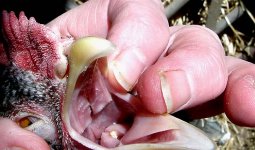darkbrowneggs
New member
Hi All - I have recently acquired a young cockerel from a top breeder, as I want to introduce a little new blood to my otherwise closed flock.
It had a longish journey in a travelling box in a car boot (not mine I hasten to add) and when it was first shown to me the first thing I noticed was there was some mucus round the nostrils. I handled it a little (its very pecky - not something I generally tolerate in my breeding stock so thinking it was distressed by the journey I put it in an isolation cage. It ate fine, took loads of grit, which apparently it was never given, and spent a lot of time drinking and flicking the water about. That night its nostrils were clear, and I wondered if it had only had access to drip water nozzles which had given it a "dirty" nose
Next day I got it out to handle it to try and reduce its aggression at being handled, and after a few minutes of trying to peck my hands whenever they came near, I noticed it was getting some clear mucus round its nostrils again, and it might have been clear and bubbly, but that might be my memory playing tricks after much research on the internet.
I have had it now about three weeks, and it is marginally calmer when handled, but I notice when I return it to the pen it has a habit of what I can only describe as snicking, almost a catch in its nose/throat. Left to its own devices this doesn't happen, though I was handling a pullet within eyesight of his pen and I noticed it did it a few times again.
I assume this is all brought on by stress, but it is something I have never experienced in any of my flock. I am particularly worried that this might be Mycoplasma, as I understand that this can be transmitted via eggs.
The bird looks healthy in every general way, though it feels surprisingly light to me, but I am only used to my own birds which I have developed into a very strong heavy strain
What are everyone's thoughts on this, and am I being unnecessarily cautious. As far as I understand it the bird is from a top class and highly reputed breeder. I would really welcome everyones input on this one
All the best
Sue
Dark Brown Eggs
It had a longish journey in a travelling box in a car boot (not mine I hasten to add) and when it was first shown to me the first thing I noticed was there was some mucus round the nostrils. I handled it a little (its very pecky - not something I generally tolerate in my breeding stock so thinking it was distressed by the journey I put it in an isolation cage. It ate fine, took loads of grit, which apparently it was never given, and spent a lot of time drinking and flicking the water about. That night its nostrils were clear, and I wondered if it had only had access to drip water nozzles which had given it a "dirty" nose
Next day I got it out to handle it to try and reduce its aggression at being handled, and after a few minutes of trying to peck my hands whenever they came near, I noticed it was getting some clear mucus round its nostrils again, and it might have been clear and bubbly, but that might be my memory playing tricks after much research on the internet.
I have had it now about three weeks, and it is marginally calmer when handled, but I notice when I return it to the pen it has a habit of what I can only describe as snicking, almost a catch in its nose/throat. Left to its own devices this doesn't happen, though I was handling a pullet within eyesight of his pen and I noticed it did it a few times again.
I assume this is all brought on by stress, but it is something I have never experienced in any of my flock. I am particularly worried that this might be Mycoplasma, as I understand that this can be transmitted via eggs.
The bird looks healthy in every general way, though it feels surprisingly light to me, but I am only used to my own birds which I have developed into a very strong heavy strain
What are everyone's thoughts on this, and am I being unnecessarily cautious. As far as I understand it the bird is from a top class and highly reputed breeder. I would really welcome everyones input on this one
All the best
Sue
Dark Brown Eggs


